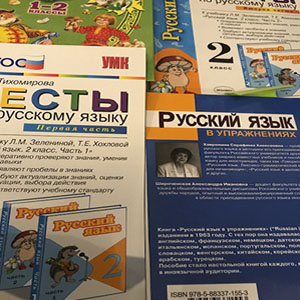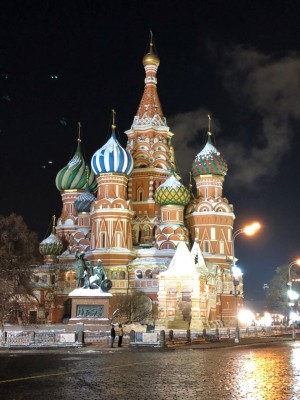How do we define the levels of language proficiency? Here are some general guidelines.
The beginner level
In a beginner Russian course, you are supposed to start from scratch, perhaps with some knowledge of simple polite words and phrases. Your course will start with studying the alphabet and practising it, before you start using a course book which will, needless to say, be written in Russian, but often with English explanations of grammar and exercise instructions.
Sometimes we have requests to teach Russian without teaching the alphabet, just the spoken version. I am afraid the answer to such requests is a firm no, unless someone just wants to learn a certain speech or a set of phrases by heart. Speaking Russian without being able to read it is of course possible but usually occurs when someone has learned the language as a child, from hearing it in their natural environment. So this is not a realistic option for adult learners doing a Russian course with a professional tutor.
Some people who have done a language course before but forgotten most of it, feel more confident calling themselves beginners, so that they can do all the revision starting from scratch. Since they will make faster progress than real beginners, we call them “false beginners”. This is not an official term but it is used quite a lot by teachers.
The “post beginner” level
A “post beginner”, or “threshold” level Russian course is for someone who has already done the alphabet (but perhaps is not very confident with it) and some very simple basics, such as common greetings and about a hundred everyday words, plus basic grammar, such as the genders of nouns, pronouns in the nominative and conjugation of simple regular verbs in the present tense. If you travel to a Russian speaking country, you should, at this level, be able to read everything around you, greet people and answer their greetings, ask simple questions and be able to answer them if dealing with a very (perhaps even extremely!) sympathetic native speaker. Reaching this level normally takes about 20 hours of tuition.
The Intermediate level
The next level up is lower intermediate. It takes about 40-50 hours of Russian lessons to achieve. In a lower intermediate Russian course you will be dealing with more basic grammar and everyday vocabulary and situations. As you continue with your course, the lower intermediate level will turn into a proper intermediate one.
Generally, the intermediate level of language proficiency covers a very wide range of sub-levels. On average, it implies that you have done 80 to 100 hours of tuition from scratch, and have knowledge of all the basic grammar, that is all the declensions of nouns, pronouns and adjectives, all the verb tenses and both verb aspects, the dreaded verbs of motion with and without prefixes, and a vocabulary of about a thousand words. So when you enrol on an intermediate Russian group course, you should expect that the levels of other people on the course will be slightly (and hopefully, only slightly) different from yours, because at this level it’s next to impossible to collect a group of people who are perfectly compatible.
In an upper intermediate Russian course you will already be working on more sophisticated grammar, such as participles and gerunds, and adding collocations and idioms to your basic vocab. You will be able to read and understand the gist, if not the details, of authentic Russian texts, that is, newspaper articles and fiction, and be able to communicate in all everyday situations and some professional ones (the ones that do not require technical vocabulary or negotiations).
The advanced level
In an advanced Russian course the teacher will presume that you know all the grammar already and can speak more or less fluently, but with occasional inaccuracies, on all general and your own professional topics. Advanced learners can easily communicate in a foreign language, and live and work successfully in a foreign country, although there is room for improvement and refinement of their language skills.
A very high near native speaker level implies total familiarity with all aspects of the language and being able to communicate successfully with any native speaker, perhaps with only minor imperfections in your usage of the language. A near native speaker, for example, may not be familiar with some idioms or slang or not being able to understand cultural references. At this level you will not need Russian lessons any more, unless you want to work on very specific things, such as improving your accent or perfecting your professional vocabulary or presentation skills.
The native speaker level
And finally, a native speaker level presumes that your knowledge of the language is, if not impeccable, very fluent and correct. A native speaker thinks and dreams in a given language, it’s part of his or her “software”. That said, the language proficiency of different native speakers is so different (just the vocabulary range can vary from a few hundred words to many thousand!) that the only thing that they have in common is the total fluency, the knowledge of the idiom, slang and common cultural references. And yes, you can be a native speaker of more than one language, although in my experience, very few people can master more than 2 or 3 languages to a native speaker level. Partly because it takes more than just the language! It involves close first hand knowledge of the society and the culture where this language is spoken.
But whatever your level, we look forward to seeing you on a Russian course in London, working on improving it to the next level up!




